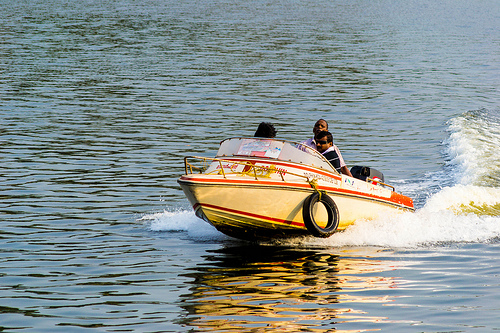 I have had a knot in my stomach ever since I read about the 16 year old girl from Greenwich, Connecticut who was killed this past Wednesday while “tubing” — getting pulled on an inner tube by a powerboat — on Long Island Sound. The girl was struck by the boat’s propeller after she fell off her tube and the boat driver went back to pick her up. Another 16-year-old girl was seriously injured by the propeller. The driver was also a 16-year-old girl, accompanied by another girl of the same age. No adults in the boat.
I have had a knot in my stomach ever since I read about the 16 year old girl from Greenwich, Connecticut who was killed this past Wednesday while “tubing” — getting pulled on an inner tube by a powerboat — on Long Island Sound. The girl was struck by the boat’s propeller after she fell off her tube and the boat driver went back to pick her up. Another 16-year-old girl was seriously injured by the propeller. The driver was also a 16-year-old girl, accompanied by another girl of the same age. No adults in the boat.
It is always delicate for me to talk about situations in which teens have died or been injured, because we now have several families faced with unspeakable grief. Yet these events also cry out for guidance on safety.
Part of my pain is that my family has enjoyed tubing on a lake for twenty years. I have spent countless hours towing my kids, my relatives’ and friends’ kids. The scariest part is making sure the propeller is not turning when the boat is anywhere near someone in the water. Most of the time I turn the engine off when approaching a kid in the water.
It is important to point out that, in the Long Island Sound fatality, the boat operation was legal. Connecticut issues boating safety licenses starting at age 12 (and both my kids got their boating certificates at that age), so there was no legal prohibition against four 16 year olds being out on the Sound in a powerboat, or tubing. News reports also say that no alcohol was involved in this week’s tragedy.
In an editorial today, the Hartford Courant called on state government to review issuing boating licenses to 12 year olds, which is a good step. But this event calls for parents to think about two things, which are applicable to teen driving but also to any form of recreation that involves equipment that can injure or kill: First, just because the state is willing to issue a license at a minimum age does not mean that state has done a study and concluded that those at that age or above can safely handle the dangers of the activity. In other words, don’t confuse legal with safe. Second is to bear in mind that the human brain does not fully develop until we reach our mid 20’s, and the last part that develops is judgment and restraint, which is why teens, even the level-headed and responsible ones, can’t and don’t fully appreciate danger and risk. Teens’ inability to fully appreciate risk needs to be a factor in every decision a parent makes about teen activities, even those that seem like just fun.


